

Let soccer do what soccer does.
Together, we can give millions of kids from underserved communities safe places to grow, thrive and build confidence for life.
Engaging the Next Wave
“You mean all of the coaches out there are girls, too?!” On a hot, summer day in Denver, Colorado, a team of nine-year-old girls cheered as they sprinted onto the field to meet the first class of Next Wave Coach Academy candidates. Thirteen young women would spend the afternoon working with the team under the guidance of a licensed instructor (also a “girl, too”) to learn best practices for coaching young players. This would be their first step on a long-term pathway to becoming coaches at the Colorado Rapids Youth Soccer Club.

Of the approximately 4.1 million youth sport coaches in America, only an estimated 650,000 are women. This leaves a void for female role models across youth sports. A recent study in the journal, Gender & Society, found an even wider gender disparity: only 13.4% of American Youth Soccer Association coaches are women.1
A lack of exposure to women in leadership roles makes a lasting impression on both girls and boys. Sport is one of the world’s most powerful social institutions and remains an important platform for shaping the perceptions and expectations of young people. While the Colorado Rapids Youth Soccer Club is currently ahead of the industry average in terms of the gender disparity among coaches – 23% of full-time, part-time, and volunteer coaches at the club are female – the vision of the club is to become known as an industry leader in engaging female coaches.
To help boost the number of female coaches at the club, Next Wave Academy piloted a coach education and mentorship program with Women in Youth Sports Coalition and WeCoach. Through the program, we helped the Colorado Rapids Youth Soccer Club engage its “next wave” of female coaches by creating an environment where women are encouraged to coach and are provided a pathway tailored to each individual.
How did we do this? We started the process by performing a needs assessment for the youth club to determine its coaching needs. Then, we recruited young women, including current club players, former players, and novice coaches, who were interested in coaching as a future career. We then interviewed each candidate to determine her coaching interests and development needs. This one-on-one interview helped us match each coach with an experienced mentor in the club with the skills to support the Next Wave Coach in her coaching journey. Over the course of the season, mentors met individually with their mentees a minimum of three times to create individual development plans, including on-field and off-field skills assessments, guided self-reflection, and evaluation.

The results of the pilot are very promising. In its inaugural season, the Next Wave Academy placed thirteen women in paid coaching positions at the Colorado Rapids Youth Soccer Club.
Throughout the season, these women earned sport-specific licenses; additionally, they gained a full season of paid work experience and each coach was supported by a mentor who is an experienced director at the club.
“I’ve been coaching with a female coach who didn’t get this opportunity when she began,” said one Next Wave candidate. “She would have loved to have this program when she started. Being new [to coaching] and a woman, it’s not easy to get into. She kind of felt thrown to the wolves. With me being in this program, I feel more prepared with extra tools in my toolbox.”
At this year’s Urban Soccer Symposium, I presented the results of this unique program, the Next Wave Academy, as part of the Symposium’s first ever gender equity track. Urban Soccer Symposium attendees were first immersed in elements of the program that potential candidates would experience, kicking off with an exercise that helped participants identify and articulate their core values. These types of activities are what make the Next Wave Academy experience unique: in addition to sport-specific licensing, the program works to empower women to be confident leaders on and off the field. These types of exercises can serve young coaches in any sport environment.

Urban Soccer Symposium attendees were presented with the three main phases that help make this program successful:
- Engaging women as coaches through strategic recruitment
- Inspiring these coaches through a holistic development approach including sport-specific licensing, leadership training, and experiential learning
- Empowering coaches by creating a support network through community-building and mentorship
Women are just one of many underrepresented demographics in the coaching world. While creating a more diverse pool of leaders requires out-of-the-box thinking, it helps us serve our players in more effective and personal ways. In the end, the hard work is worth it.
“When I step onto the field I do not feel intimidated by being a woman,” said a Next Wave coach candidate. “I feel strong. I want to use that strength to empower the players I coach.”
1 Messner, M. (2009). It’s All for the Kids: Gender, Families, and Youth Sport. Women in Sport and Physical Activity Journal, Vol. 18(Issue 1). pp 102-103
Kincaid Schmidt is Founder, of Next Wave Academy and Zone 1 Technical Director, Colorado Rapids Youth Soccer Club.
The 2019 Urban Soccer Symposium hosted attendees from 183 organizations and 31 U.S. states. Follow this link to learn more about the three-day event.
